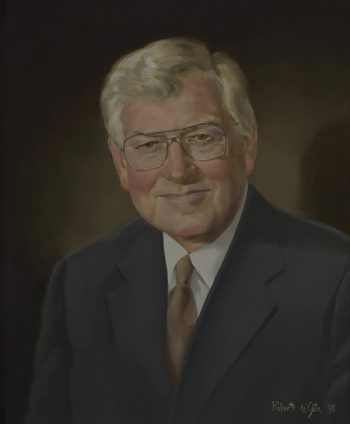Dr. Clayton M. Switzer
- Canadian Agricultural Hall of Fame
- Inductees
- Dr. Clayton M. Switzer

- Inducted: 1998
- Residing Province: Ontario
- Gallery Location: 162
Dr. Clayton M. Switzer
- (1929
- -
- )
Clayton Macfie Switzer, visionary, leader and diplomat has served the industry of agriculture in several capacities using foresight, encouraging teamwork and managing resources with finesse. He continues to be active in consulting. Clay has an innate quality of judgment and perspective that encourages closure on difficult issues. His approach has always been professional, yet interspersed with a sense of humour. His competence has given him a broad array of experiences which he brings to the administrative decision making process.
Clay Switzer obtained early education in Middlesex County, a BSA from University of Toronto (OAC) and a Ph.D. from Iowa State University. Then Dr. Switzer beginning as a lecturer in 1955, progressed through all the ranks to become Dean of the Ontario Agricultural College in 1972, a post in which he served until 1983.
Through his excellence in teaching at OAC, Clayton impacted positively a huge number of students who are now leaders in Canada’s modern agri-food industry. As a superb plant physiologist and weed scientist he worked closely with all in the industry, keeping efficacy and environmental concerns in perspective.
As Dean of OAC, he shaped the Ontario Agricultural College into a leading educational and research institution serving Ontario and Canada. He promoted quality in education and research programs, and developed a curriculum that recognized business aspects of agriculture.
During his years as Deputy Minister in the Ontario Ministry of Agriculture Food and Rural Affairs (1984 to 1989) and afterwards, Clay led in policy formulation and implementation. He helped the National Task Force on Farm Finance to understand the finance problems that plagued farmers in the late-1980s. He built consensus on numerous occasions where disparate views were being promoted by federal and provincial ministers alike. He improved relationships between governments and other stakeholders in agriculture. Clay Switzer helped attract an increasing share of the provincial budget to the agriculture industry. Clay was able to improve the communication and understanding of environmental issues from the perspective of both producers and Ministry of Environment personnel.
Clay championed Guelph as a centre of excellence in food and food processing research, as well as in agriculture. He championed the turf grass industry, and negotiated a unique partnership among the industry, OMAFRA and the University of Guelph to create the Guelph Turfgrass Institute. He then led a fundraising drive that allowed industry to build the G.M. Frost Research and Information Centre and finance turf grass research on a continuing basis.
While president of the Agricultural Institute of Canada, Clay Switzer facilitated the resolution of internal problems to allow the institute to move forward as a respected voice in agricultural policy.
As executive director of the Canadian Federation of Deans of Agriculture and Veterinary Medicine, Dr. Switzer guided through to implementation, the idea of accreditation to provide a positive impact on maintaining high quality in agricultural education programs in Canada.
Clay Switzer served on 18 industry councils and major committees, earned at least six academic awards and 14 honours or life memberships in institutes and associations.
Clayton and spouse Dorothy continue to live in Guelph, where they raised a family of three, participated in baseball and golf, and contributed to the well being of society.
Clayton Macfie Switzer has certainly earned a place of honour in the Canadian Agricultural Hall of Fame.
Clayton Macfie Switzer, visionnaire, leader et diplomate a servi l’industrie de l’agriculture en utilisant sa vision, en encourageant le
travail d’équipe et en gérant les ressources avec finesse. Il continue à être actif dans les services de consultation. Clay à un bon
jugement et de la perspective qui lui permettent de faire avancer les dossiers difficiles. Avec un bon sens professionnel teinté
d’humour, sa compétence lui a donné un large éventail d’expériences qu’il apporte au processus de prise de décision.
Clay Switzer a fait ses études de base dans le comté de Middlesex et a obtenu un BSA de l’Université de Toronto et un doctorat
de l’Université de l’état de l’Iowa. Débutant comme professeur externe en 1955, il a gravi les échelons pour devenir doyen de
l’Ontario Agricultural College en 1972, un poste qu’il a occupé jusqu’en 1983.
Grâce à son excellence à tire d’enseignant à l’OAC, Clayton a eu un rôle positif sur un grand nombre d’étudiants qui sont
maintenant des leaders dans l’industrie agro-alimentaire moderne du Canada. Un grand physiologiste des plantes et scientifique
des mauvaises herbes, Clay Switzer a travaillé en étroite collaboration avec l’industrie, gardant en priorité l’efficacité et les
préoccupations environnementales.
Alors qu’il était doyen, l’Ontario Agricultural College est devenu un établissement d’enseignement et de recherche de premier plan
pour l’Ontario et le Canada. Il a amélioré la qualité des programmes éducationnels et de la recherche, et a élaboré un programme
qui reconnaît les aspects commerciaux de l’agriculture.
Au cours de ses années en tant que sous-ministre au ministère de l’Agriculture de l’Alimentation et des Affaires rurales (1984-
1989) et par la suite, Clay à travailler à l’élaboration et la mise en œuvre de différentes politiques. Il a aidé le Groupe de travail
national sur le financement agricole à comprendre les problèmes de financement qui ont touché les agriculteurs à la fin des
années 1980. Il a amené à des consensus quand des points de vue disparates avaient été promus par les ministres fédéraux et
provinciaux. Il a amélioré les relations entre les gouvernements et les autres partenaires dans l’agriculture. Clay Switzer a réussi à
obtenir une plus grande part du budget provincial pour l’industrie agricole. Clay a pu améliorer la communication et la
compréhension des questions environnementales entre les producteurs et le ministère de l’Environnement.
Clay a fait la promotion de Guelph comme un centre d’excellence dans la recherche alimentaire et la transformation des aliments,
ainsi qu’en agriculture. Il a défendu l’industrie du gazon, et a négocié un partenariat unique entre l’industrie, le Ministère de
l’Agriculture, de l’alimentation et des affaires rurales et l’Université de Guelph pour créer la Guelph Turfgrass Institute. Il a ensuite
géré une campagne de financement qui a permis à l’industrie de construire le G.M. Frost Research and Information Centre et de
financer la recherche sur la pelouse en plaque sur une base continue.
En tant que président de l’Institut agricole du Canada, Clay Switzer a facilité la résolution des problèmes internes pour permettre à
l’institut de devenir une voix respectée dans la politique agricole.
En tant que directeur exécutif de la Fédération canadienne des doyens de l’agriculture et de médecine vétérinaire, Dr Switzer a
guidé la mise en œuvre d’un programme d’accréditation pour améliorer la qualité des programmes d’éducation agricole au
Canada.
Clay Switzer a siégé à 18 conseils de l’industrie, a gagné au moins six prix académiques et 14 honneurs ou adhésions de membre
à vie dans les instituts et associations.
Clayton et son épouse Dorothy continuent à vivre à Guelph, où ils ont élevé une famille de trois enfants, sont actifs dans le
baseball et le golf, et ont contribué au bien-être de la société.
Clayton Macfie Switzer a gagné une place d’honneur au Temple canadien de la renommée agricole.
- Agricultural Institute of Canada
- OAC Alumni Association
- Canadian Golf Superintendents Association
- University of Guelph
- Ontario Ministry of Agriculture Food and Rural Affairs
- Ontario Institute of Agrologists
- Ontario Agricultural College (OAC)


